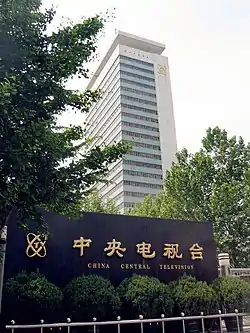China Media Group
China Media Group (Chinese: 中央广播电视总台; lit. 'Central Radio-Television General Station') and IPA pronunciation [ʈʂʊ́ŋ.jáŋ.kwàŋ.pwó.tjɛ̂n.ʂɻ̩̂.tsʊ̀ŋ.tʰǎi],[1][2] also known as Voice of China,[3][4][5] is the predominant state media company by means radio and television broadcasting in the People's Republic of China. It was founded on 21 March 2018 as a national holding firm for China Central Television[note 1], China National Radio, and China Radio International.[6]
 China Central Television former headquarters, now China Media Group headquarters | |||||
| Type | State-owned enterprise | ||||
|---|---|---|---|---|---|
| Industry | State media | ||||
| Predecessors | |||||
| Founded | 21 March 2018 | ||||
| Headquarters | China Media Group Headquarters, , China | ||||
Area served | Worldwide | ||||
Key people | Shen Haixiong (President) | ||||
| Owner | People's Republic of China | ||||
| Parent | Publicity Department of the Communist Party of China State Council of the People's Republic of China | ||||
| Divisions | |||||
| China Media Group | |||||||
|---|---|---|---|---|---|---|---|
| Simplified Chinese | 中央广播电视总台 | ||||||
| Traditional Chinese | 中央廣播電視總台 | ||||||
| Literal meaning | Central Radio and Television Station | ||||||
| |||||||
| Alternative Chinese name | |||||||
| Simplified Chinese | 中国之声 | ||||||
| Traditional Chinese | 中國之聲 | ||||||
| Literal meaning | Voice of China | ||||||
| |||||||
History
On 21 March 2018, the Government of the People's Republic of China announced that the China Central Television, China National Radio, and China Radio International would form part of a new national supercorporation, the China Media Group, after the first session of the 13th National People's Congress. That same day, Shen Haixiong, was officially new named President of the CCTV and China Media Group.[7]
CMG was created to serve as the holding company of the People's Republic's national and international radio and television broadcasting services, which link millions of Chinese in the mainland, Hong Kong and Macau and in Taiwan and expatriates abroad.
In 2020, several of CMG's assets, particularly China Global Television Network and China Radio International, were designated as foreign missions by the United States Department of State.[8][9]
List of presidents
| No. | Name | Took office | Left office | Notes |
|---|---|---|---|---|
| 1 | Shen Haixiong | 21 March 2018 | Incumbent | [10][11] |
See also
Notes
- includes China Global Television Network
References
- "Trailer of Media Leaders Summit for Asia". China Radio International. 8 April 2018. Archived from the original on 9 April 2018. Retrieved 9 April 2018.
- "China Hosts Media Leaders for Asia Summit". MENAFN.com. 11 April 2018. Archived from the original on 11 April 2018. Retrieved 11 April 2018.
- Stone, Curtis (22 March 2018). "World needs a better understanding of China, "Voice of China" can help". People's Daily. Archived from the original on 22 March 2018. Retrieved 8 April 2018.
- Kuo, Lily (21 March 2018). "China state media merger to create propaganda giant". The Guardian. Archived from the original on 22 March 2018. Retrieved 8 April 2018.
- Jiang, Steven (21 March 2018). "Beijing has a new propaganda weapon: Voice of China". CNN. Archived from the original on 21 March 2018. Retrieved 8 April 2018.
- 中共中央印发《深化党和国家机构改革方案》 (in Chinese). NetEase. Xinhua News Agency. 21 March 2018. Archived from the original on 21 March 2018. Retrieved 9 April 2018.
- 慎海雄任中央广播电视总台台长. NetEase (in Chinese). China Central Television. 21 March 2018. Archived from the original on 21 March 2018. Retrieved 9 April 2018.
- Jakes, Lara; Myers, Steven Lee (2020-02-18). "U.S. Designates China's Official Media as Operatives of the Communist State". The New York Times. ISSN 0362-4331. Archived from the original on 2020-03-24. Retrieved 2020-08-22.
- Naranjo, Jesse. "U.S. to treat 5 Chinese media firms as 'foreign missions'". POLITICO. Archived from the original on 2020-07-05. Retrieved 2020-08-22.
- 重磅|中央广播电视总台成立,慎海雄担任首任台长 (in Chinese). China National Radio. 22 March 2018. Archived from the original on 22 March 2018. Retrieved 9 April 2018.
- 国务院任免国家工作人员 (in Chinese). Xinhua News Agency. 4 April 2018. Archived from the original on 9 April 2018. Retrieved 9 April 2018.